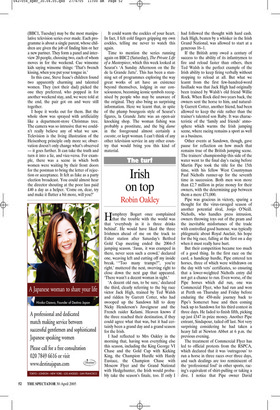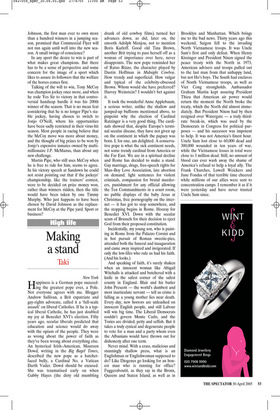Irish on top
Robin Oakley
Humphrey Bogart once complained that the trouble with the world was that ‘everybody in it is three drinks behind’. He would have liked the three Irishmen ahead of me on the track to Esher station after Saturday’s Betfred Gold Cup meeting ended the 2004–5 jumping season. ‘Jasus, it was cramped in there, never seen such a crowd,’ declared one, weaving left and cutting off my inside break. ‘ “Too many tramps?”, you’re right,’ muttered the next, swerving right to close down the next gap that appeared. ‘There wasn’t a decent woman in sight.’ ‘A decent old run, to be sure,’ declared the third, clearly referring to the big race victor Jack High, trained by Ted Walsh and ridden by Garrett Cotter, who had swooped up the Sandown hill to deny Nicky Henderson’s Juveigneur and the French raider Kelami. Heaven knows if the three reached their destination, if they could agree what that was, but it had certainly been a grand day and a grand season for the Irish.
I had reflected to Mrs Oakley in the morning that, having won everything else this season, including the King George VI Chase and the Gold Cup with Kicking King, the Champion Hurdle with Hardy Eustace, the Champion Chase with Moscow Flyer and the Grand National with Hedgehunter, the Irish would probably take the season’s finale, too. If only I had followed the thought with hard cash. Jack High, beaten by a whisker in the Irish Grand National, was allowed to start at a generous 16–1.
If the British army owed a century of success to the ability of its infantrymen to fire and reload faster than others, then Ted Walsh is the perfect example of the Irish ability to keep firing verbally without stopping to reload at all. But what we learnt from the first few-hundred-word fusillade was that Jack High had originally been trained by Walsh’s old friend Willie Rock. When Rock died two years back, the owners sent the horse to him, and naturally Garrett Cotter, another friend, had been allowed to keep the ride rather than the trainer’s talented son Ruby. It was characteristic of the ‘family and friends’ atmosphere which warms the Irish jumping scene, where racing remains a sport as well as a business.
Other events at Sandown, though, gave pause for reflection on how much that remains true of the British jumping scene. The trainers’ championship this side of the water went to the final day’s racing before Martin Pipe took the title for the 15th time, with his fellow West Countryman Paul Nicholls runner-up for the seventh time in succession. Both men won more than £2.7 million in prize money for their owners, with the determining gap between them a mere £71,000.
Pipe was gracious in victory, sparing a thought for the virus-ravaged season of another potential rival, Jonjo O’Neill. Nicholls, who handles press intrusion, owners throwing toys out of the pram and the inevitable misfortunes of the trade with controlled good humour, was typically phlegmatic about Royal Auclair, his hope for the big race, falling at the first on a day when it must really have hurt.
But their competition became too much of a good thing. In the first race on the card, a handicap hurdle, Pipe entered ten horses, three of which were withdrawn on the day with vets’ certificates, so ensuring that a lower-weighted Nicholls entry did not get a chance to run. Even worse, of the Pipe horses which did run, one was Commercial Flyer, who had run and won at Perth on Thursday and Friday before enduring the 450-mile journey back to Pipe’s Somerset base and then coming back up to Sandown for his third contest in three days. He faded to finish fifth, picking up just £547 in prize money. Another Pipe entrant, Sindapour, tailed off last. Not very surprising considering he had taken a heavy fall at Newton Abbot at 6 p.m. the previous evening.
The treatment of Commercial Flyer has led to official protests from the RSPCA, which declared that it was ‘outrageous’ to run a horse in three races over three days, and such dealings are too reminiscent of the ‘professional foul’ in other sports, racing’s equivalent of shirt-pulling or taking a dive. I notice that Pipe owner David Johnson, the first man ever to own more than a hundred winners in a jumping season, promised that Commercial Flyer will not run again until well into the new season. A small twinge of conscience?
In any sport the desire to win is part of what makes great champions. But there has to be a sense of perspective and some concern for the image of a sport which likes to assure its followers that the welfare of the horses comes first.
Talking of the will to win, Tony McCoy was champion jockey once more, and when he rode Yes Sir to victory in that controversial handicap hurdle it was his 200th winner of the season. That is no mean feat considering that he is no longer Pipe’s stable jockey, having chosen to switch to Jonjo O’Neill, where his opportunities have been sadly restricted in their virus-hit season. Most people in racing believe that the McCoy move was more about money, and the thought of big prizes to be won by Jonjo’s expensive inmates owned by multimillionaire J.P. McManus, than about any new challenge.
Martin Pipe, who still uses McCoy when he is free to ride for him, seems to agree. In his victory speech at Sandown he could not resist pointing out that if the jockeys’ championship, like the trainers’ contest, were to be decided on prize money won, rather than winners ridden, then the title would have been taken by one Timmy Murphy. Who just happens to have been chosen by David Johnson as the replacement for McCoy at the Pipe yard. Sport or business?





















































 Previous page
Previous page